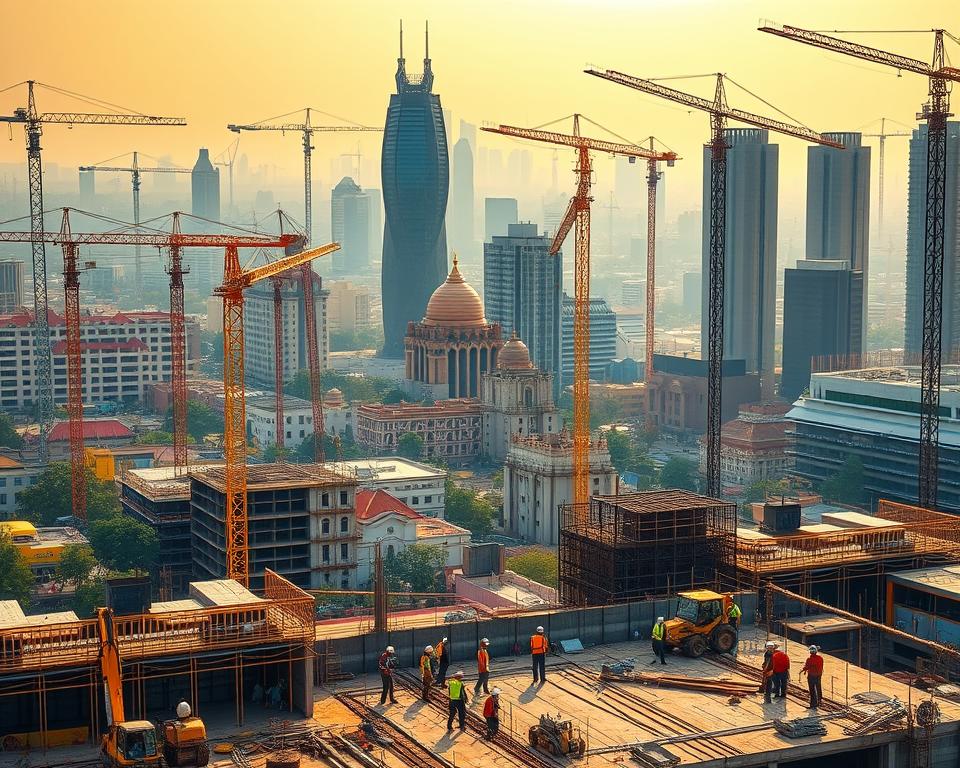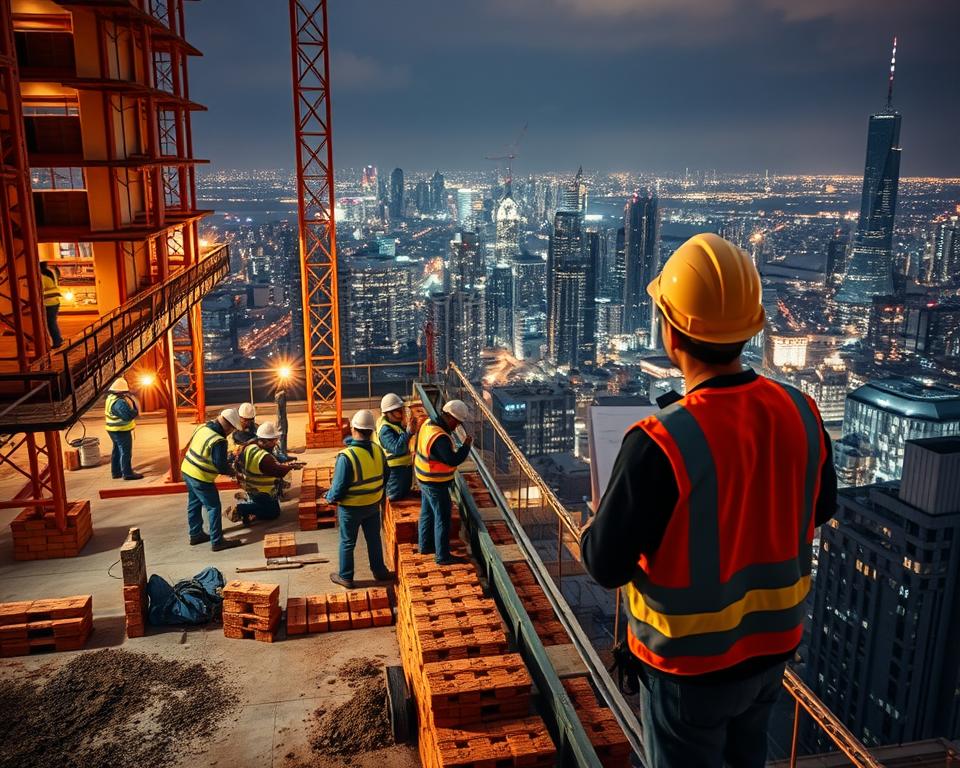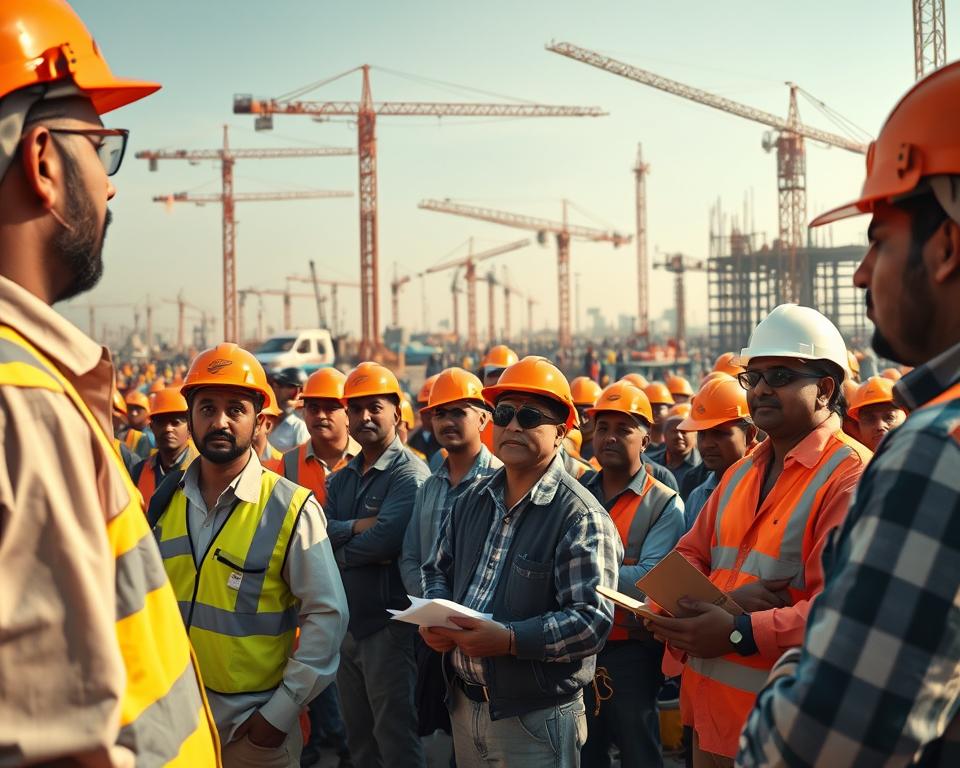The construction industry is a big part of India’s economy. It helps the country grow and develop.
Many infrastructure projects are happening. This means more jobs for skilled engineers and manual labour.
The Indian construction sector is set to grow a lot. This is thanks to government plans and investments in new projects.
Key Takeaways
- The construction industry is a vital part of India’s economy.
- There is a growing demand for skilled engineers and manual labour.
- Government initiatives are driving growth in the sector.
- India’s infrastructure development is creating new opportunities.
- The sector is expected to witness significant growth in the coming years.
The Current State of India’s Construction Industry
India’s construction industry is booming. This is thanks to government plans and big infrastructure projects. These changes are reshaping the country and opening up many jobs for different skills.
Growth Projections and Market Size
The construction industry in India is set to grow fast. It will grow at a compound annual growth rate (CAGR) of 7-8%. This growth is because of more money going into building projects.
The market size is also going to get bigger. The government wants the construction sector to make up 15% of the GDP by 2025.

Impact of Government Initiatives on Construction Employment
Programs like the Smart Cities Mission and Pradhan Mantri Awas Yojana are helping jobs in construction. They have increased the need for skilled and unskilled workers. This has opened up new chances for people all over the country.
The government’s push for more infrastructure has also led to more jobs. These jobs are in engineering and supervisory roles. This is helping the construction industry grow even more.
Understanding Construction Jobs in India – Labour & Engineer Hiring
Construction jobs in India cover many roles. They range from simple labour jobs to complex engineering tasks. Knowing the different jobs available is key.
The Hierarchy of Construction Roles
The construction world has a clear job order. At the start are unskilled labourers. They do manual work that needs no special skills.
Then come semi-skilled workers. They have some training and help skilled workers. Next are skilled labourers, like electricians and plumbers, who have special skills.
At the top are engineers and project managers. They plan and manage construction projects.

Formal vs Informal Employment in Construction
Construction jobs fall into two groups: formal and informal. Formal employment means working for a registered company. Workers get regular pay and benefits like health insurance.
Informal employment is common. Workers are hired on a casual or contract basis. They miss out on social security benefits. Improving job security and conditions is a big goal.
It’s important to know the difference between formal and informal jobs. This helps in making work better for everyone. It’s about fair treatment and safety for all workers.
Types of Construction Labour Jobs Available
The Indian construction industry has many labour jobs for different skills. These jobs are key for the success of construction projects all over the country.
Unskilled Labour Positions
Unskilled labour jobs are for beginners. They don’t need experience or special skills. Workers do tasks like cleaning, carrying stuff, and helping skilled workers.
These jobs are common in construction. They offer a chance to learn and maybe get a better job later.
Semi-Skilled Labour Roles
Semi-skilled labour jobs need some training or experience. They involve using machines, tools, and doing tasks that need some knowledge. Semi-skilled workers help keep construction sites running smoothly.
Skilled Labour Opportunities
Skilled labour jobs need special skills from training or experience. Jobs include electricians, plumbers, carpenters, and masons. Skilled workers are very important for the quality and safety of projects.
Engineering Positions in the Construction Sector
India’s construction industry is growing fast. This means more skilled engineers are needed. The sector is investing in roads, bridges, and buildings, creating lots of jobs for engineers.
Civil Engineering Roles
Civil engineers are key in the construction world. They handle the design, building, and upkeep of projects. Civil engineering jobs in India are everywhere, in both government and private jobs. They make sure projects are done on time, within budget, and meet quality standards.
Structural Engineering Opportunities
Structural engineers are very sought after. They design and check the structure of buildings and projects. Structural engineering opportunities are plentiful in India, mainly in cities. Their work is vital for the safety and strength of buildings.
Emerging Specialisations in Construction Engineering
The construction field is changing, with new areas of focus. Emerging specialisations in construction include green building and BIM. Engineers with skills in these areas will find many job chances as the industry gets greener and more efficient.
Education and Training Pathways
The Indian government is focusing on building more infrastructure. This means we need more skilled construction workers than ever. The construction world is changing, and so are the ways we learn about it.
Vocational Training for Construction Labour
Vocational training is key for construction workers. It gives them real-world skills. Industrial Training Institutes (ITIs) and Polytechnic Institutes offer courses that help people get good jobs.
These programs are for both new and semi-skilled workers. They help them find better jobs.
Engineering Degrees and Diplomas
If you want to be an engineer, you need a Bachelor’s degree in Civil Engineering. Many top schools in India offer these programs. They teach a wide range of topics important for construction.
Diploma courses focus on specific areas like structural engineering. They give students deep knowledge in these fields.
Continuing Education and Upskilling Opportunities
The construction field is always changing. New tech and methods come out all the time. Continuing education and upskilling are key for keeping up.
Many places and online sites offer courses and certifications. They help workers improve their skills and stay ahead in the job market.
Investing in education and training can really boost your career in construction. Whether it’s through vocational training or engineering degrees, there are many ways to succeed.
Essential Qualifications and Skills for Construction Jobs
Construction jobs in India need many skills. You need technical know-how and good people skills. As the industry grows, more people with the right skills are needed.
Technical Skills in High Demand
Technical skills are key in construction. Knowing CAD software and building information modelling (BIM) is very important. Also, skills for scaffolding, rigging, and heavy machinery are needed for jobs.
Soft Skills for Construction Professionals
Soft skills are also very important. Effective communication, teamwork, and problem-solving are essential. These help manage teams, work with clients, and solve problems on site.
Industry-Recognised Certifications
Getting industry-recognised certifications boosts your job chances. OSHA (Occupational Safety and Health Administration) and NVQ (National Vocational Qualification) are highly valued. They show you care about safety and quality.
How to Find Construction Job Opportunities
Construction job seekers in India have many ways to find jobs. The industry’s growth means more jobs for both labour and engineering roles.
Online Job Portals and Industry Websites
Online job portals are a great way to find construction jobs. Sites like Naukri.com and TimesJobs have lots of job listings. There are also special construction job portals with targeted jobs.
Recruitment Agencies and Contractors
Recruitment agencies for construction jobs can make finding work easier. They often know contractors and have jobs not listed online.
| Agency Name | Specialisation | Location |
|---|---|---|
| ABC Recruitment | Construction Labour | Mumbai |
| XYZ Staffing | Engineering Roles | Delhi |
Networking and Industry Connections
Networking is key in finding construction jobs. Go to industry events, join professional groups, and use LinkedIn to connect. This can lead to job leads and valuable contacts.
Using these methods, construction pros can improve their job search. They can find better job opportunities.
The Application Process for Construction Jobs
To stand out in India’s construction job market, knowing the application process is key. Whether you’re applying for labour positions or engineering roles, a well-crafted application can significantly improve your chances of securing a job.
Creating an Effective Construction Resume
A strong resume is vital for making a good first impression. When applying for construction jobs, your resume should highlight relevant experience, skills, and certifications. Use construction resume tips to tailor your resume to the specific job you’re applying for, focusing on your achievements and qualifications.
For example, if you’re applying for a site manager position, highlight your experience in managing construction sites. Mention any successful projects you’ve overseen.
Ensure your resume is concise, clear, and free of errors. Use bullet points to list your skills and experiences, making it easier for hiring managers to scan through. For example, you might list your skills as follows:
- Project management
- Team leadership
- Quality control
Preparing for Construction Job Interviews
Preparation is key to acing a construction job interview. Research the company, understand the job requirements, and be ready to discuss your relevant experience. Use construction job interview preparation techniques such as practicing common interview questions.
It’s also beneficial to prepare examples of your past work, such as successful projects you’ve managed or challenges you’ve overcome. For example, you might describe a situation where you had to resolve a conflict between team members on a construction site.
Practical Tests and Skill Demonstrations
Some construction employers may require practical tests or skill demonstrations as part of the application process. These assessments are designed to evaluate your hands-on skills and ability to perform tasks relevant to the job. For practical tests construction jobs, be prepared to demonstrate your proficiency in areas such as operating construction equipment, reading blueprints, or implementing safety protocols.
For instance, if you’re applying for a role that involves operating heavy machinery, you might be asked to demonstrate your ability to safely operate a crane or excavator. Ensure you’re familiar with the equipment and practices relevant to the job you’re applying for.
Salary Expectations in the Indian Construction Sector
Knowing what you can earn is key if you want to work in India’s construction industry. This field has many jobs, from simple tasks to complex engineering roles. Each job has its own pay scale.
Labour Wage Ranges Across Regions
Wages for construction workers change a lot depending on where you are in India. In big cities like Mumbai and Delhi, workers can make ₹15,000 to ₹25,000 a month. This depends on their skills and how long they’ve been working.
In smaller cities, workers might earn less. They could make ₹10,000 to ₹20,000 a month.
Engineering Salary Brackets by Experience Level
Engineering salaries in India depend on your experience, skills, and what you specialise in. New civil engineers can earn ₹30,000 to ₹50,000 a month.
Those with 5-10 years of experience can make ₹60,000 to ₹1,00,000 a month. More experienced engineers or those with special skills can earn over ₹1,50,000 a month.
Benefits and Compensation Packages
Construction companies in India often give more than just a salary. They offer health insurance, help with savings, paid holidays, and bonuses. Some even give extra money for travel, living on-site, or for working in hard-to-reach places.
Regional Variations in Construction Employment
Construction jobs vary a lot across India. This includes big cities, smaller towns, and rural areas. Each place has its own level of growth and job chances.
Metropolitan Construction Markets
Big cities like Delhi, Mumbai, and Bengaluru are full of big construction projects. These include tall buildings, homes, and new roads. There are many jobs for workers and experts here.
The need for metropolitan construction jobs is high. This is because more people are moving to cities and need new places to live and work.
Tier-2 and Tier-3 City Opportunities
Tier-2 and tier-3 cities are growing fast. This is thanks to government plans and new roads and buildings. Places like Pune, Ahmedabad, and Surat are getting busier.
These cities offer tier-2 city construction opportunities for workers and engineers. They are also better places to live than big cities.
Infrastructure Development in Rural Areas
Rural areas are also getting more construction work. This is mainly because of government plans to improve roads, homes, and water systems. This work creates jobs for local people and some engineers.
Rural infrastructure development is key for the construction industry’s growth. It helps connect rural areas with cities.
In summary, India’s construction industry offers many jobs in different places. Knowing about these differences helps both job hunters and employers understand the job market better.
Working Conditions and Labour Laws
It’s key to know about working conditions and labour laws in India’s construction industry. The work is tough, and following safety rules is vital. This helps avoid accidents and keeps the workplace safe.
Safety Standards and Regulations
The Indian government has set construction safety standards to protect workers. These rules require personal protective equipment (PPE), safety training, and safety plans. They aim to reduce risks.
Working Hours and Site Conditions
Working hours construction sites can be long, often going past regular hours. Workers face tough site conditions like bad weather, loud noises, and hard physical work. These can harm their health and work performance.
Legal Protections for Construction Workers
India has laws to protect construction workers, like the Building and Other Construction Workers (Regulation of Employment and Conditions of Service) Act, 1996. This law helps regulate work, ensures fair pay, and offers welfare for workers.
In summary, India’s construction industry has rules to protect workers and ensure a safe work place. By following these laws, everyone can help make the construction sector better and safer.
Women in India’s Construction Industry
India’s construction industry is slowly becoming more diverse. Women are taking on new roles. This change is helping the industry grow and change.
Current Participation and Challenges
Women make up a small part of India’s construction workforce. They face many challenges, including:
- It’s hard for them to find jobs because of old beliefs
- They don’t have the right facilities on site
- They often get paid less and get promoted less
It’s important to tackle these issues to get more women in the industry.
Initiatives Promoting Gender Diversity
There are many efforts to make the industry more diverse:
- Training for women to learn new skills
- Campaigns to change how people see women’s roles
- Rules for fair pay and safe work places
These steps are key to making the industry more welcoming.
Success Stories and Role Models
There are many women who have done well in construction. For example, women-led teams have finished big projects. Their stories inspire other women to join and do well.
More women in construction is a good thing. With more support, their numbers are likely to grow. This will help the industry grow and become more diverse.
Career Progression and Growth Opportunities
India’s construction industry is growing fast. This is because of new infrastructure and more people moving to cities. Workers can move up in their careers in many ways.
From Labour to Supervisory Roles
Workers can become supervisors with more experience and skills. Training programs and certifications help a lot. For example, a worker can become a supervisor by showing leadership and knowing how to manage projects.
Engineering Career Advancement Paths
Engineers can grow by working on bigger projects, getting more education, or focusing on green building. Continuous learning and professional development are important. They can also get certifications that are respected in the industry.
Entrepreneurship in Construction
Starting a business in construction is a big chance for many.
“Entrepreneurship in construction requires a deep understanding of the industry, business acumen, and the ability to manage risks.”
Successful business owners in this field know lots of people and keep up with new trends.
The construction industry in India is full of chances for career growth. There are many ways for people to move up and do well.
Conclusion
The construction industry in India is very important for the country’s economy. It offers many jobs for both labourers and engineers. The industry is growing thanks to government plans and new projects.
There are many different jobs in construction, from simple labour to complex engineering roles. Knowing about these roles, education, and skills is key for a career in this field.
Jobs for labour and engineers in India’s construction sector will keep growing. Opportunities are found in big cities and smaller towns, as well as rural areas. It’s important for professionals to keep up with new trends and technologies.
In short, construction jobs in India are a great chance for a career. By understanding the industry, job seekers can find good opportunities and help build the country’s infrastructure.


